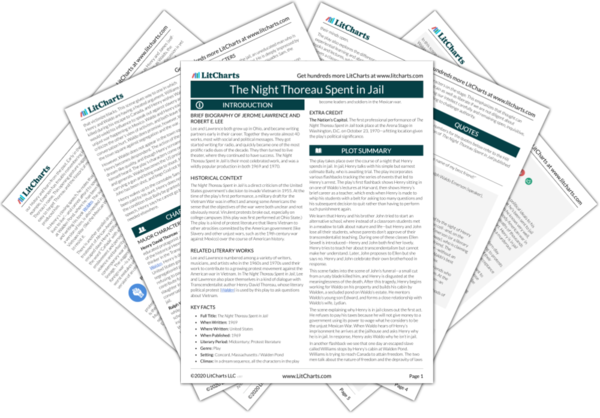The play repeatedly wonders about civil disobedience, political action (and inaction), and protest. It asks: which forms of resistance are effective? What is the best way for a citizen to stand up against corruption? Must we work within the existing system to effect change or separate ourselves from the system and work outside of it? Early in the play, we see Henry struggle with how best to effect meaningful action. He is a teacher, and must temper his defiance against the school board in order to ensure he will retain his job and still be available to his students. But he is ordered to flog the students, and this violence disgusts him so much that he quits.
This question about working within a system or apart from it is one that endures throughout the play. Waldo (Ralph Waldo Emerson) wields an immense amount of influence, in part because he is careful about obeying rules and avoids being excluded by the community. Henry is the opposite—he is defiant, angry, and his retreat to Walden to live in and contemplate nature in isolation is criticized by Waldo as ineffectual and useless. How can he help people escape injustice if he is away in the woods? But Henry’s criticism of Waldo also has merit. Waldo is limited by his abstract thinking and desire for belonging and respect—all of which stops him from speaking out against the Mexican War.
Another issue raised by the play is the problem of community—is it best to work alone as Henry and James (self-proclaimed “celibates”) do? Or with others, as Waldo, the (admittedly inadequate) family man does? This discussion is yet again deeply relevant to Vietnam. Activists, artists and politicians were often at odds in their ideas of how best to effect change. A new culture of protest was forming, especially among young Americans and students who wanted to resist a war in which participation for many was, because of the military draft, literally compulsory? The play ultimately portrays resistance as not just lonely defiance (as it is for Henry) nor as merely removed and abstract (as it is for Waldo)—instead it is a complex combination of the two.
Protest, Resistance, Community, and Action ThemeTracker

Protest, Resistance, Community, and Action Quotes in The Night Thoreau Spent in Jail
“Cast conformity behind you!”
“Cast…Conformity…Behind You…!”
I want to be as much as possible like Ralph Waldo Emerson.
For you and me, deacon, the declaration of Independence has already been written. Young Thoreau has to declare it every day.
I gotta git to Cañada!
Always do the right thing, even if it’s wrong.
Seems to me I’ve got several more lives to live.











